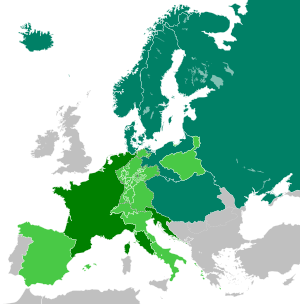
Back الحصار القاري Arabic Bloquéu Continental AST Kontinental blokada Azerbaijani Кантынэнтальная сыстэма BE-X-OLD Континентална блокада Bulgarian Bloqueig Continental Catalan گەمارۆدانی کیشوەری CKB Kontinentální blokáda Czech Fastlandsspærringen Danish Kontinentalsperre German

The Continental Blockade (French: Blocus continental), or Continental System, was a large-scale embargo by French Emperor Napoleon I against the British Empire from 21 November 1806 until 11 April 1814, during the Napoleonic Wars. Napoleon issued the Berlin Decree on 21 November 1806 in response to the naval blockade of the French coasts enacted by the British government on 16 May 1806.[1][2] The embargo was applied intermittently, ending on 11 April 1814 after Napoleon's first abdication.
Aside from subduing Britain, the blockade was also intended to establish French industrial and commercial hegemony in Europe.[3] Within the French Empire, the newly acquired territories and client states were subordinate to France itself, as there was a unified market within France (no internal barriers or tariffs) while economic distortions were maintained on the borders of the new territories.[4]
The Berlin Decree forbade the import of British goods into any European countries allied with or dependent upon France, and it installed the Continental System in Europe. All connections with Britain were to be cut, even mail. However there was extensive smuggling, which made the Continental System an ineffective weapon of economic war.[5] There was some damage to British trade,[6] especially in 1808 and 1812, but British control of the oceans led to replacement trade with North and South America, as well as large scale smuggling in Europe particularly from Malta which was used by the British to sell their goods to southern Italy.
The loss of Britain as a trading partner also hit the economies of France and its allies.[7] Angry governments gained an incentive to ignore the Continental System, which led to the weakening of Napoleon's coalition.[8] As Napoleon realised that extensive trade was going through Spain and Russia, he invaded those two countries. His forces were tied down in Spain, in which the Spanish War of Independence occurred simultaneously, and suffered severely in, and ultimately retreated from, Russia in 1812.
- ^ David Stephen Heidler; Jteanne T. Heidler (2004). Encyclopedia of the War of 1812. Naval Institute Press. p. 48. ISBN 978-1-59114-362-8.
- ^ Jean Tulard, Napoléon, Hachette, 2008, p. 207
- ^ Aaslestad, Katherine (2022), Forrest, Alan; Hicks, Peter (eds.), "Blockade and Economic Warfare", The Cambridge History of the Napoleonic Wars: Volume 3: Experience, Culture and Memory, vol. 3, Cambridge University Press, pp. 117–141, doi:10.1017/9781108278119.007, ISBN 978-1-108-41767-9
- ^ Marzagalli, Silvia (2022), Broers, Michael; Dwyer, Philip (eds.), "Napoleonic Wars and Economic Imperialism", The Cambridge History of the Napoleonic Wars: Volume 1: Politics and Diplomacy, vol. 1, Cambridge University Press, pp. 232–252, doi:10.1017/9781108334846.013, ISBN 978-1-108-42437-0
- ^ Paul W. Schroeder, The Transformation of European Politics 1763–1858 (1999) pp. 305–10
- ^ Alfred Fierro; André Palluel-Guillard; Jean Tulard (1995). Histoire et dictionnaire du Consulat et de l'Empire. Robert Laffont. ISBN 2-221-05858-5.
- ^ Alexander Grab, Napoleon and the Transformation of Europe (2003) pp. 29–33
- ^ François Crouzet, "Wars, blockade, and economic change in Europe, 1792–1815." Journal of Economic History (1964) 24#4 pp. 567–88 JSTOR 2115762.
© MMXXIII Rich X Search. We shall prevail. All rights reserved. Rich X Search